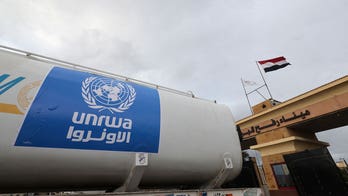Pentagon officials are speaking publicly about the military's new 30,000-pound massive ordnance penetrator, or MOP, known now as the biggest "bunker-busting bomb" in the world.
The Air Force has already received an undisclosed number of these bombs from Boeing, all designed to fit exclusively with the B-2 and B-52 bombers.
"It gives us a far greater capability to reach and destroy an enemy's weapons of mass destruction that are located in well protected underground facilities... to a magnitude far greater than we have now," Pentagon Spokesman Capt. John Kirby said at a briefing Wednesday.
But, strangely, Kirby denied these bombs are designed to target Iran, the only country known to have buried its nuclear weapons program.
"The system is not aimed at any one country, it's to develop a capability we believe we need," Kirby said. That remark was met by audible groans and various comments of disbelief from the Pentagon press corps.
It has been widely reported that Iran has buried it's nuclear weapon production facilities at least 90 meters underground at locations in Natanz and Qom.
This new bomb is ideal for addressing that threat.
According to Boeing’s website the MOP includes a GPS navigation system and more than 5,300 pounds of explosives. It measures 20 feet long and is “designed specifically to attack hardened concrete bunkers and tunnel facilities.”
Boeing successfully tested the bomb on March 17, 2007 at White Sands Missile Range in New Mexico.
Pentagon Spokesman George Little says the MOP is far more powerful than its predecessor, the BLU-109. Some estimate it’s as much as 10 times more powerful.
The Pentagon says it has contracted for a total of 20 bombs from Boeing, some of which were delivered in the fall. But, for purposes of operational security it won’t disclose how many.
On August 2, 2011 the Air Force signed a contract for eight more, meaning it's unlikely it has more than 12 bombs.
News that this new 15-ton MOP is now ready for use comes just days after it was revealed that the U.S. sold the United Arab Emirates smaller, but very lethal bunker buster bombs.
Public saber rattling from Israel about potentially conducting a strike of its own against Iran also has Pentagon officials deeply concerned, forcing them to make contingency plans of their own.





